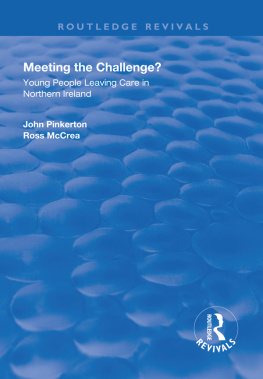First published 1999 by Ashgate Publishing
Reissued 2018 by Routledge
2 Park Square, Milton Park, Abingdon, Oxon OX14 4RN
711 Third Avenue, New York, NY 10017, USA
Routledge is an imprint of the Taylor & Francis Group, an informa business
Copyright John Pinkerton and Ross McCrea 1999
All rights reserved. No part of this book may be reprinted or reproduced or utilised in any form or by any electronic, mechanical, or other means, now known or hereafter invented, including photocopying and recording, or in any information storage or retrieval system, without permission in writing from the publishers.
Notice:
Product or corporate names may be trademarks or registered trademarks, and are used only for identification and explanation without intent to infringe.
Publishers Note
The publisher has gone to great lengths to ensure the quality of this reprint but points out that some imperfections in the original copies may be apparent.
Disclaimer
The publisher has made every effort to trace copyright holders and welcomes correspondence from those they have been unable to contact.
A Library of Congress record exists under LC control number: 98074128
ISBN 13: 978-1-138-32511-1 (hbk)
ISBN 13: 978-0-429-45056-3 (ebk)
Over the two and a half years of the Northern Ireland Leaving Care Research Project many people made valued contributions. The initial ideas and subsequent support from Mike Stein and his colleagues in Leeds were much appreciated. Funding from the Department of Health and Social Services and the Northern Ireland Office made it possible to pursue those ideas. Both agencies were represented on the Research Steering Group which was set up to oversee and support the work of the project. The individual and collective efforts of the members of the Steering Group ensured that the various funding, strategic and access needs of the project were met. We hope the contribution the research process has already made to the debate about developing leaving care services in Northern Ireland has gone some way towards justifying that financial and time commitment.
Testing and developing our understanding of leaving care in Northern Ireland required access to those with direct experience of what it involved. A number of practitioners who work with young people leaving care accepted an invitation to act as a Support Group to the researchers. We are very grateful for the time they gave so that we might benefit from their knowledge, experience and insight.
Special thanks are due to the Social Services management and staff who acted as our main source of data. Many of these individuals helped in both the survey and the follow up work and in doing so took considerable time out of their already busy work schedules to assist the study. Without these key informants the study could not have happened.
Invaluable technical support in the production of the book was provided by Rosaleen Gormley, Centre for Child Care Research, Department of Social Work, The Queens University of Belfast.
There are of course many others, too numerous to list here and some necessarily anonymous, whose contributions we benefited from and which we gratefully acknowledge. But in particular we want to stress the obligation we feel towards the young people whose experiences of leaving care are the subject of our study. Not only were their experiences reported to us by staff but many of them also contributed directly by generously taking the time to answer the questions put to them by the researchers. Again we hope the contribution the research may make to improving leaving care services will justify our intrusion into their lives.
1
Recognising the Challenge
Each year across the United Kingdom thousands of young people leave the care of the state. That care has regularly been held up to question. The grave concerns expressed in the Utting Report (Utting 1997) take their place in a long line reaching back throughout the entire post war period to the Curtis Report of 1946 (Parker 1990). That concern has increasingly been reinforced by the findings of research. In particular material gathered together in the 1980s (DHSS 1985, 1991) painted a dismal picture of a child welfare system characterised by compulsion, severance of parental contact, lack of planning and young people cut adrift at the end of their time in state care.
With the growing recognition of this state of affairs went commitment to legislative reform, to more proactive policy and to the improvement of practice. All of these required better understanding of the needs of the children and families, the services they were being offered, the process of engagement between needs and services and the outcomes of that process. As a result there has developed a much fuller programme of research within UK child welfare than ever before. Inevitably such development has provided uneven coverage to all aspects of the field. One of the relatively under researched areas is leaving care. There are only a handful of large scale empirical studies which focus on care leavers (Biehal et al 1992, 1995; Broad 1998; Garnett 1992; Stone 1989) and the level of methodological and theoretical debate about their needs and the services they received is very underdeveloped (Stein 1997).
The aim of this book is to make a contribution to a research based understanding of care leaving through presenting both empirical findings and conceptual material. Key concepts relating to adolescence, child care careers, outcomes and youth transition are integrated to provide some theoretical underpinning to a study of young people leaving care in Northern Ireland. The study provides detailed information on an entire cohort of young people leaving state care during a six months period in the early 1990s - their personal characteristics, the main features of their experience of leaving and aftercare support as part of their care careers and their coping up to two years after leaving. Through combining conceptual and empirical material the books conclusions detail the manner in which a high quality leaving care service might be developed; including the research agenda that could usefully contribute to this. It also suggests that such a development needs to be seen as a variation on the theme of how best to meet the social policy challenge of youth transitions in contemporary Britain.
The research on which this book is based emerged from a growing recognition of the importance of leaving care as an aspect of child care provision which occurred from the mid 1970s on. The 1980s in particular were important years of advance in all parts of the UK - albeit at a different pace and in different ways according to the particular historical, social, economic and political realities of the separate jurisdictions (Pinkerton and Stein 1995; Aldgate and Hill 1995). Within England and Wales the awakening of leaving care within the professional and political consciousness was the consequence of developments involving young people in care themselves, practitioners and managers in statutory and voluntary agencies, researchers, campaigners pressure groups and politicians. The impact of these developments culminated in new responsibilities towards care leavers being clearly contained within the Children Act of 1989 (Stein 1991). In Northern Ireland although the same constituents came into play the development was slower and was led by practitioners and policy makers rather than interest groups and research.








